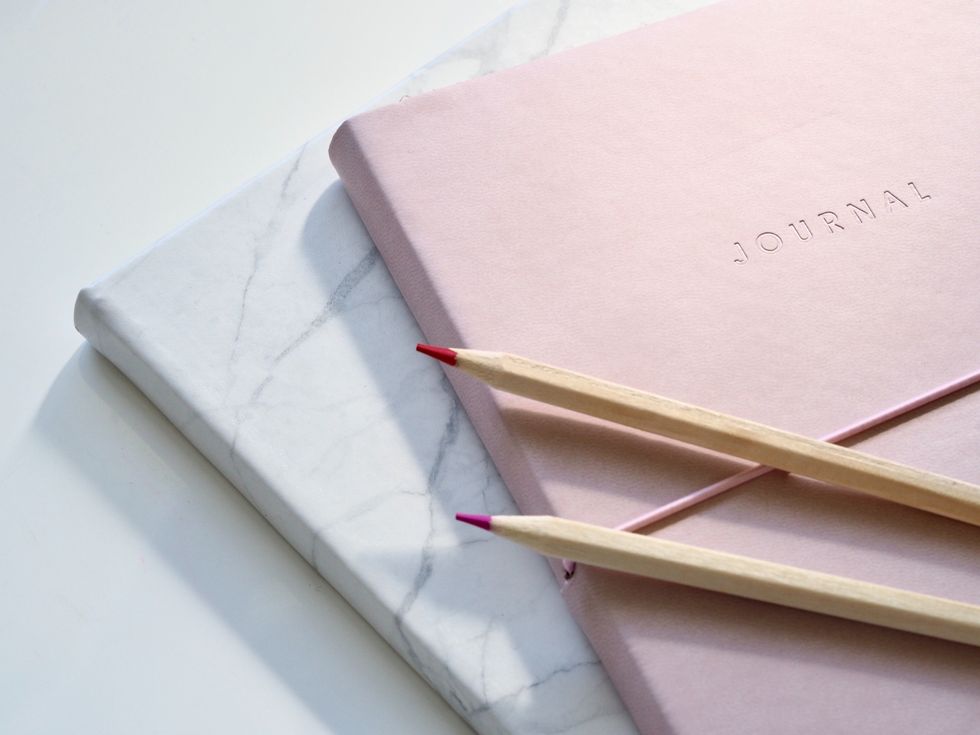The most common advice I receive for my anxiety generally stems back to distractions. In order to help stress and overthinking, you have to occupy your mind through essentially anything that will bring your focus from the "what if's". Meaning it's helpful to find a hobby or things you love that allows you to channel nervous energy, otherwise it's easy to become more stressed. Activities that stimulate and hold attention work best and are valuable tools to distract from the uncomfortable sensation that accompanies anxiety - whether mental or physical.
It's extremely easy for someone with anxiety to become obsessed about how they feel in these instances - it's not fun and it's a rough cycle. However, the less preoccupied you allow yourself to be, the less opportunity to obsess over the anxious symptoms. So finding something that you enjoy that holds your attention is a good way to distract from constantly assessing the anxiety.
I have always been a classic over thinker and have found it impossible over the years to find anything interesting enough to distract from the awful feelings being anxious brings. However, it has become more manageable over the years - so if you struggle with this issue like I do, here are few things I have found that help me during those rough days.
Watch a documentary.

Photo by JESHOOTS.com from Pexels
Using entertainment as a distraction has worked for me during bad times of anxiety for the past few years. I'm a Criminal Justice major, so I find serial killer/crime documentaries hold my focus enough to ground myself a bit more. They're interesting enough that I can give my focus to it instead of my symptoms. Of course, it's different for everyone.
I also used to watch YouTube videos, which are essentially endless. Watching TV, a movie, reading or listening to music are also good ways of doing this. Some days it changes and that's okay. It's important to find what you feel that day and let it consume you so you can distract your brain from the alarms.
Do something you love.

Photo by Porapak Apichodilok from Pexels
This may seem like a no-brainer and a natural solution for many people, however, I know when I'm anxious it's hard for me to push myself to any distractions. When you immerse your mind in interests or something you love, it helps focus that anxious energy away from what you're stressing about. This may not always do the trick, but I find it takes me down a few notches.
For example, when I practice new songs on the piano, it's something that occupies my concentration and also is something that inspires me (so it isn't all that painful). Getting yourself there can be hard but it's rewarding when you can find an outlet.
Go for a drive.

Photo by Riccardo Bresciani from Pexels
Driving can be a great opportunity to give yourself some much-needed alone time and allows you a chance to disconnect from your cell phone, that can be hard to avoid otherwise.
Daniel Giers, CEO/Clinical Director/Psychotherapist at Healthy Strides says:
"First, when you drive, you bring focus to multiple sensory inputs including sight, sound, and feel. Generally, the more brain activity you give to non-stress events, the less focus you have for the stressful event itself.
Second, and this needs little explanation, that driving is a great distraction from overthinking.
Third, and the one that gets ignored the most, is the removal. If your stress is either related to, exacerbated by, or thought of in your living/work environment, removing yourself by driving away from the location gives you literal and figurative space between you and the problem. In the literal sense, you can physically depart from the area.
In the figurative sense, you are removing yourself from any reminders of the anxiety. This is not to imply that driving will make you simply forget the issue. Rather, it will offer you a new view away from the problem at hand and give your head space to either relax or come up with new solutions."
Go to the gym.

Photo by Victor Freitas from Pexels
I'm not an athletic person and when my therapist mentioned this to me I hardcore rolled my eyes. I know the whole spiel about working out being as effective as anti-depressants, but I have awful fatigue and thought she was nuts. How can working out help me be less exhausted?
However, it's scientifically proven to relieve symptoms of anxiety and depression. I'm always amazed at how much better I feel afterward. Doing something for 30 minutes to get your heart rate up helps channel that nervous energy and gets your endorphins, chemicals in the brain that act as natural painkillers, flowing again.
Even when I do something as simple as walking on the treadmill for 30 minutes I noticed an increase in my energy and my mood after an otherwise pretty awful day.
Channel your breathing.

Photo by Oleksandr Pidvalnyi from Pexels
One of the most common symptoms of a panic attack is feeling like you can't breathe, therefore, one of the most popular recommendations is through practicing breathing exercises. There are many different ways you can channel your breathing, which also can include meditation or yoga. There are plenty of apps that can help guide through all of these things. It's also best in social situations because you practice it quickly at any time to gain some control.
Spire has a blog post on the best breathing exercises and you can find several step-by-step techniques here.
"Reclaim your sense of calm by training yourself to breathe through anxiety or panic attacks. Better breathing, which requires conscious thought, relaxes your autonomic nervous system and reduces those attacks.
Here are a few benefits of trying these breathing exercises for anxiety:
- Its effect is nearly instant and nearly universally effective.
- It doesn't need to be complicated to work.
- It works at the physiological level to automatically slow your heart rate.
- It calms body systems that are in fight, flight or freeze mode.
- You can focus on your breathing anywhere.
- It's free."
Write it out.

Photo by Jess Watters from Pexels
Organizing thoughts can be a great way to help relieve stress as it facilitates problem-solving and is a form of emotional release - there are many benefits to journaling for a healthy lifestyle. It can help manage anxiety, reduce stress, cope and is a way you can track things like symptoms or triggers. It's an opportunity for positive self-talk and a way you can identify negative thoughts and behaviors. You can be as creative as you want because there are many different forms, even writing poetry or short stories, etc.
My therapist had used this method once as a way to identify how irrational some of my fears were. It's helpful when you can see them written and organized on a piece of paper instead of bouncing around inside your head. Sometimes little things like these are enough to give a new perspective.
Stress relief is a major reason why I started writing for Odyssey as well because it lets you express yourself creatively while also connecting with others that share similar experiences.
Pet a furry friend.

Photo by Caio Resende from Pexels
There's something comforting about coming home after a long day and being greeted by wagging tails. I always underestimate how much comfort my dogs bring me. There's a reason therapy animals exist.
Playing with or petting an animal can decrease the hormone cortisol which is associated with depression and anxiety. It increases levels of the stress-reducing hormone oxytocin and can even decrease blood pressure. Plus it's hard to be as sad with the company of man's best friend and a little unconditional love.
Take a shower.

Photo by bruce mars from Pexels
This is similar to the reasons for taking a drive because it forces you to disconnect. This is one of my go-to stress relievers for as long as I've had anxiety because it's one of the only things that stops me from overthinking. It forces me to step away from the situation and into an "environment" that is relaxing and comforting.
Taking a shower (or a bath!) is relaxing in itself. It gives the opportunity to be alone without any interruptions so you can think through how you're feeling or even just have the quiet of not thinking at all. Water is a good reliever for many other ailments, especially with warm water which helps tension and stiff muscles. Hot showers can help boost your oxytocin levels which ease the anxiety.
Nap, or lie down for awhile.

Photo by Ivan Obolensky from Pexels
Laying down or taking naps allows you to have "you" time to recuperate. I feel like this can be especially helpful to college students - there are many things in our lives that demand constant balance and napping can be an easy solution when you're short on time. Just having 30-45 minutes can release some tension and give you back some energy for a new perspective. Some benefits of napping include headache relief, dramatic reduction of stress levels, improved relationships and a decrease in muscle pain.
Beds are also the ultimate safe space.
Many suggest going into a dark, quiet place where there are no distractions around and you can focus on actually relaxing. Making sure you are completely comfortable is also really important. If you are in any way uncomfortable, your body will not relax and your nap will be pointless.
Be kind to yourself.

Photo by Swapnil Deshpandey from Pexels
Lastly, understand that these feelings won't last forever. It is important to note that your feelings aren't you and although they're uncomfortable, they're okay to feel. When you're able to acknowledge them and why they may be happening, it's easier to gain control. You're not burying them or dismissing them, just allowing yourself to keep control. It's so easy to blame yourself for what you're feeling but the truth is all of those feelings are valid.
That's why it's most important to be kind to yourself and what you're feeling. I have never had much good come out of self deprecating during panic attacks. You're safe. You're not your anxiety and certainly not the panic. You've felt this way before and survived.




































